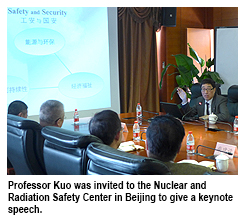President’s talk in Beijing receives overwhelming responses
Yvonne Lee
?Professor Way Kuo, President of City University of Hong Kong (CityU), was invited by Peking University (PKU) and the Nuclear and Radiation Safety Center (NRSC) in Beijing to deliver a keynote speech titled “Critical Reflections on Nuclear and Renewable Energy” on 16 and 17 March, respectively.
Speech at PKU
Professor Xu Zhihong, former President of PKU, introduced Professor Kuo to the more than 300 attendees, saying that he was a Member of the US National Academy of Engineering and Academia Sinica in Taiwan, as well as a Foreign Member of the Chinese Academy of Engineering and Russian Academy of Engineering.
Professor Kuo discussed the supply and usage of energy from the perspective of sustainable development in the modern era in his talk. “When evaluating the energy sources for sustainable development, we must balance such aspects as environmental protection, economic well-being, reliability and sustainability in a reasonable manner,” he stressed.
Professor Kuo argued that environmental pollution, global warming and energy shortage were challenges of the 21st century. The power humans need in their daily lives is mainly generated from hydro, thermal, nuclear, wind, solar, biomass, tidal, and geothermal energy. Professor Kuo coined the term “Rainbow Energy” to describe these energy sources.
Over 70% of mainland China’s power is generated by thermal energy, and that is why smog has been such a problem in recent years. Compared with thermal power, nuclear power is cleaner and safer. However, many people worry about the safety of nuclear power, in particular after the incident at Japan’s Fukushima nuclear power plant in 2011. Professor Kuo pointed out that the incident in the Fukushima nuclear power plant was in fact a case of poor management. If we give up nuclear power and reduce the use of thermal power, the energy sources we are left with would be of unstable quality and limited quantity. It would also be difficult to maintain sustainability, and the energy would be expensive. Hence developed countries all over the world still rely on and benefit from thermal power or nuclear power. All in all, each energy source in “Rainbow Energy” has its pros and cons, and they all have limitations. Professor Kuo’s new book Critical Reflections on Nuclear and Renewable Energy is published by Peking University Press. Royalties will be donated towards a scholarship for students.Professor Kuo is renowned for his work in designing the reliability of electronics systems and nuclear energy. He is a pioneer in reliability research of systems at their infant stage, and has set international standards and a theoretical foundation for the testing of the reliability of electronic products. His popular science book Critical Reflections on Nuclear and Renewable Energy was published in 2013 by Commonwealth Publishing Group in Taiwan. The simplified Chinese edition is published by Peking University Press, and a Hong Kong edition was published under a different title. The book has been translated into many languages, and that the English, Japanese, French and Russian editions have been published in Massachusetts in the US, Tokyo, Paris, and Moscow, respectively.
Speech at NRSC in Beijing
Professor Kuo was also invited to deliver a speech, titled “Critical Reflections on Nuclear and Renewable Energy – The Critical Importance Measure”, at the NRSC in Beijing. More than 60 staff members from the NRSC, Tsinghua University and China Nuclear Power Engineering Co. Ltd attended the event, including Mr Li Zongming, Secretary of the Party Committee and Deputy Director-General; Mr Zhang Zhigang, Deputy Director-General; and Mr Chai Guohan, Chief Engineer; and several others.Professor Kuo said that it was necessary for nuclear plants to find the “importance element” and strive for improvement, which is an effective way to raise safety levels.
NRSC is a public institution directly under the Ministry of Environmental Protection of China. It is the only public institution specialising in providing technical guarantees for the supervision and administration of nuclear safety and radiation environment in China. Its responsibilities include: providing all-round technical support and assurance to the safety supervision and administration of China’s civilian nuclear facilities and radiation environment, monitoring and supervising nuclear safety and radiation environment, responding to and making assessment on nuclear and radiation emergencies, and conducting scientific research on nuclear safety and radiation protection, among others.



